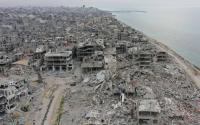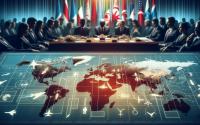by Duncan Green11 June 2009www.guardian.co.uk/commentisfree/cif-green/2009/jun/11/recession-climate-change-g8
As the first signs of "green shoots" start to appear in headlines and the housing market, a rather depressing question keeps nagging at me: "Is the current economic 'shock' big enough?" It might seem an odd question to ask when a crisis is destroying jobs, decimating trade and driving many countries to the brink of insolvency. No one, least of all Oxfam, is hoping for anything but a quick recovery.
But crises do not only destroy; they can also create once-in-a-generation opportunities when the world re-examines the way we do things. Women won the vote in Britain after the first world war had transformed their role in society. In the US the Great Depression led to the New Deal. As Rahm Emmanuel, Obama's chief of staff, remarked recently: "You never want a serious crisis to go to waste."
Could the current crisis create the conditions for profound changes that would benefit the majority of the world's people in the long run; or is the current doom and gloom devoid of any such silver lining?
The latest figures from the IMF are certainly shocking. The global economy is in full recession, predicted to shrink by 1.3% this year (at least until the next downward revision of forecasts). Advanced economies have suffered a massive 3.8% fall in output. And although the developing world isn't doing quite so badly as the rich countries - it is predicted to achieve sluggish positive growth - a close examination of the numbers reveals that the impact on poor people looks very worrying.
In per capita terms (ie allowing for population growth), developing country economies are shrinking, after years of progress. Using the World Bank estimate that a loss of 1% of global economic output pushes 20m people into poverty, by the end of 2009, 100 million more people will be living below $1.25 a day than would otherwise be the case. Stop and read that again: below $1.25 a day.
That certainly fits economists' definition of a "shock", and a big one at that. What changes might such a shock trigger? There are already signs of some tectonic shifts. First, the geopolitical - the crisis has crystallised the rise of China. After keeping its head down during three decades of "peaceful rise", Chinese diplomacy has suddenly become far more assertive, openly blaming the west for the crisis and calling for major reforms of the international financial system. The era of the G2 (US and China) begins here. More broadly, the G8 is now looking increasingly obsolete - real power has shifted to the G20, with far greater recognition of the role of emerging economies such as Brazil and India, as well as China.
Second, the end of the Great Deregulation. Since finance was let off the leash in the mid 1970s, it has boomed and come to dwarf the real economy. By 2007 the daily flow of capital across borders was 100 times greater than world trade. Backed by the power to make and break economies, the whims and prejudices of financial markets acquired absurd political importance. That has now given way to an era of reregulation and downsizing of the financial sector. Good thing too.
But other impacts are worrying or absent. At the G20 in London in April, the world wrote a huge cheque to the International Monetary Fund, in return for promises of reform. But it is far from certain that the IMF can transform itself from being an austerity-wielding devotee of the "Friedmanite tourniquet" to being an advocate of the kind of Keynesian reflation that is needed in poor countries right now.
Most worrying of all, climate change has so far taken a back seat. The G20 largely ignored the issue; progress in the UN talks that culminate in Copenhagen in December is glacial. But we are running out of time. The longer we take in beginning a fundamental (and probably painful) shift to a low-carbon economy, the worse the climate change and pain of transition will become. At the current rate global greenhouse gas emissions will double in 25 years. They need to start falling fast by 2015 at the latest.
Some argue that we should sort out the economic crisis first, and then turn our attention to the longer-term issues such as climate change, but that is to ignore the role of crises in driving change.
The creation of the UN, World Bank and IMF - the global order of the second half of the 20th century - was the product of both the Great Depression and the second world war. World leaders meeting at the G8 next month have a real chance to grasp their once-in-a-generation opportunity. But my fear is that the current economic collapse will not be enough to convince us or them of the need for change. Will we need the climate equivalent of a world war before we and our leaders accept the need to shift to a low carbon world? The scale of such a climate shock, its irreversibility, and the impact on the lives of millions of ordinary people make that a very bad last resort.






